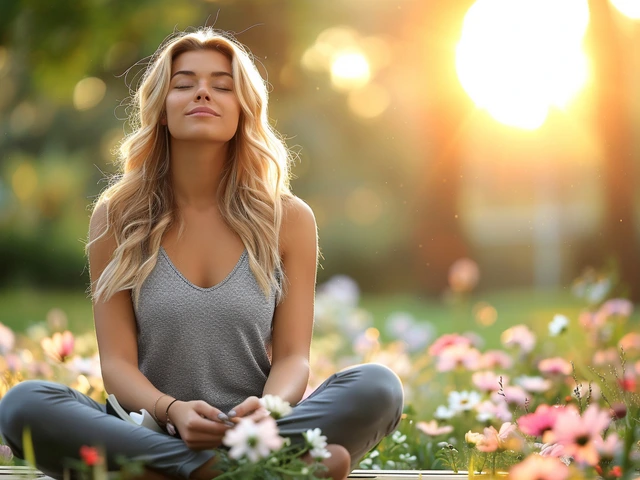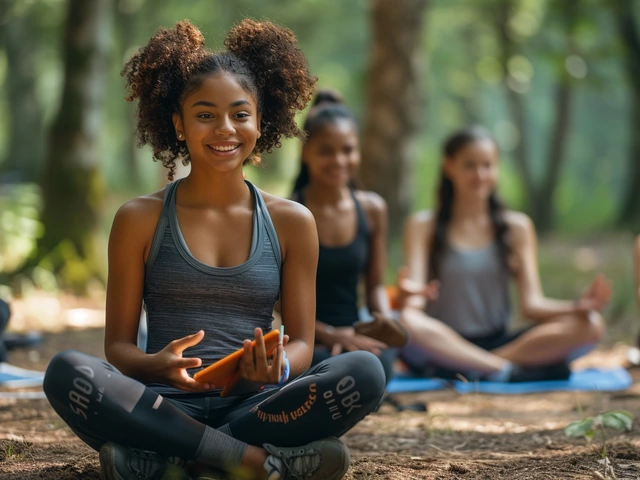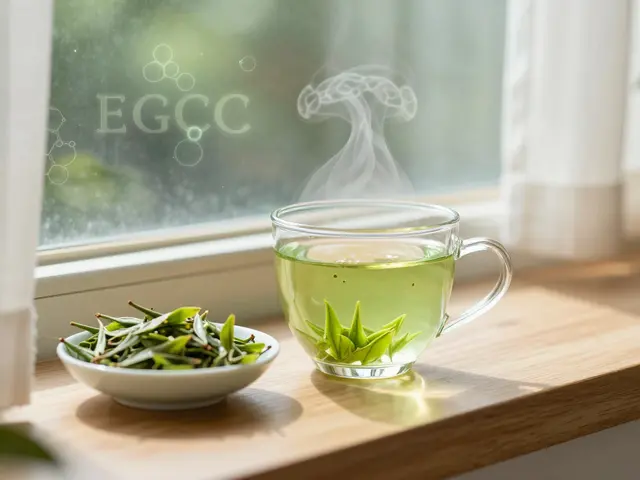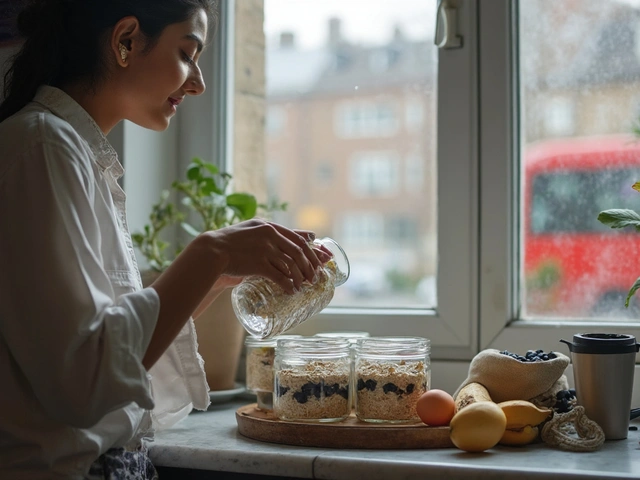Feeling overwhelmed by the hustle and bustle of everyday life? You’re not alone. Many of us struggle to find that elusive balance between work, family, and personal time. Thankfully, there are simple techniques you can use to achieve a state of tranquility and well-being.
In this article, we will explore a variety of relaxation methods that can help you decompress and recharge. From meditation and breathing exercises to the healing power of nature and physical activity, we’ve got tips to fit every lifestyle and preference. So, grab a cup of tea, find a comfy spot, and let’s dive into the world of relaxation.
- Understanding Relaxation
- Meditation and Mindfulness
- Breathing Exercises
- The Power of Nature
- Physical Activity for Relaxation
- Incorporating Relaxation into Daily Life
Understanding Relaxation
Relaxation isn't just about lounging on the couch or taking a vacation. It encompasses a wide range of activities that aim to reduce stress and enhance your well-being. At its core, relaxation is about giving your mind and body a break from the everyday grind. But what does this really mean? It means different things to different folks. For some, it might be engaging in a hobby they love, while for others, it’s about finding moments of peace in nature.
One of the foundational aspects of relaxation is its capacity to lower stress hormones like cortisol in your body. Elevated levels of cortisol can lead to health problems such as high blood pressure, weight gain, and even a weaker immune system. So, mastering relaxation is not just about feeling good—it's a crucial aspect of maintaining your overall health.
Research shows that engaging in regular relaxation activities can help improve mental clarity, boost your mood, and even prolong your life. A study published in the American Journal of Psychiatry found that people who practiced mindfulness-based relaxation techniques reported fewer symptoms of anxiety and depression. The data speaks for itself, making the case for incorporating relaxation into your daily routine.
"To experience peace doesn’t mean your life is always beautiful. It means you are capable of tapping into a blissful state amidst chaos." - Dr. Debasish Mridha
Understanding your own unique needs and stressors is the first step toward effective relaxation. What works wonders for one person might be ineffective for another. Therefore, it’s essential to experiment with different techniques and find what resonates with you. Are you more inclined towards physical activities like yoga or gentle stretching? Or perhaps you prefer mental exercises like meditation and breathing techniques?
Identifying the triggers that cause your stress is equally important. Are you overwhelmed by work deadlines, or is it the clutter in your home that weighs on you? By pinpointing your sources of stress, you can tailor your relaxation activities to address these specific needs. Consider keeping a stress journal where you write down what triggers your stress and reflect on which relaxation techniques you’ve tried. This can offer insightful patterns and guide you towards more effective strategies.
Incorporating wellness tips from various sources can also be beneficial. Sometimes, something as simple as ensuring you drink enough water or take short breaks during work can contribute to your overall sense of calm. It's surprising how minor tweaks can significantly affect your mental state.
Remember, relaxation is a skill that you can develop over time. It might not come naturally at first, especially if you're used to being on the go. But with consistent practice, you can train your mind and body to relax more efficiently, making it a valuable tool in your arsenal for a healthier, happier life.
Meditation and Mindfulness
Meditation and mindfulness are powerful tools to help reduce stress and improve overall well-being. In today's fast-paced world, it's easy to get caught up in a whirlwind of activities and forget to take a moment to breathe. By integrating these practices into your daily life, you can foster a deeper sense of calm and focus.
Many people believe meditation requires sitting for hours in complete silence, but that’s a common misconception. You can start with just five minutes a day. Find a quiet place, sit comfortably, and focus on your breath. If your mind starts to wander, gently bring your focus back to your breathing without judgment. This simple practice alone can work wonders for your mental state.
Mindfulness, on the other hand, involves being fully present and engaged in the current moment. It doesn’t necessarily require a special setting or significant time commitment. You can practice mindfulness while eating, walking, or even during mundane tasks like washing dishes. The key is to bring full attention to the activity at hand, noticing sights, sounds, smells, and physical sensations without trying to change anything.
Studies have shown that regular practice of meditation and mindfulness can lead to numerous benefits. According to the American Psychological Association, mindfulness can help improve attention, reduce emotional reactivity, and increase cognitive flexibility. These practices are also known to lower stress levels and reduce symptoms of anxiety and depression.
“Mindfulness isn't difficult, we just need to remember to do it.” – Sharon Salzberg
To get started with meditation and mindfulness, consider using guided sessions available through apps like Headspace or Calm. These resources offer a variety of exercises tailored to different needs, whether you're looking to reduce stress, sleep better, or increase your focus. Many of these apps also include short practices that can easily fit into your daily routine.
Moreover, attending a local meditation class or joining a mindfulness group can provide a supportive environment and enhance your practice. Being around like-minded individuals can be motivating and provide valuable insights through shared experiences. In Perth, for instance, several community centers and yoga studios offer classes that can help you get started on this peaceful journey.
Remember, the goal of meditation and mindfulness is not to eliminate thoughts but to observe them without attachment. It's about creating a space where you can experience stillness and clarity amidst the chaos of daily life. By consistently practicing these techniques, you can build resilience, enhance emotional regulation, and cultivate a deeper connection with yourself and the world around you.
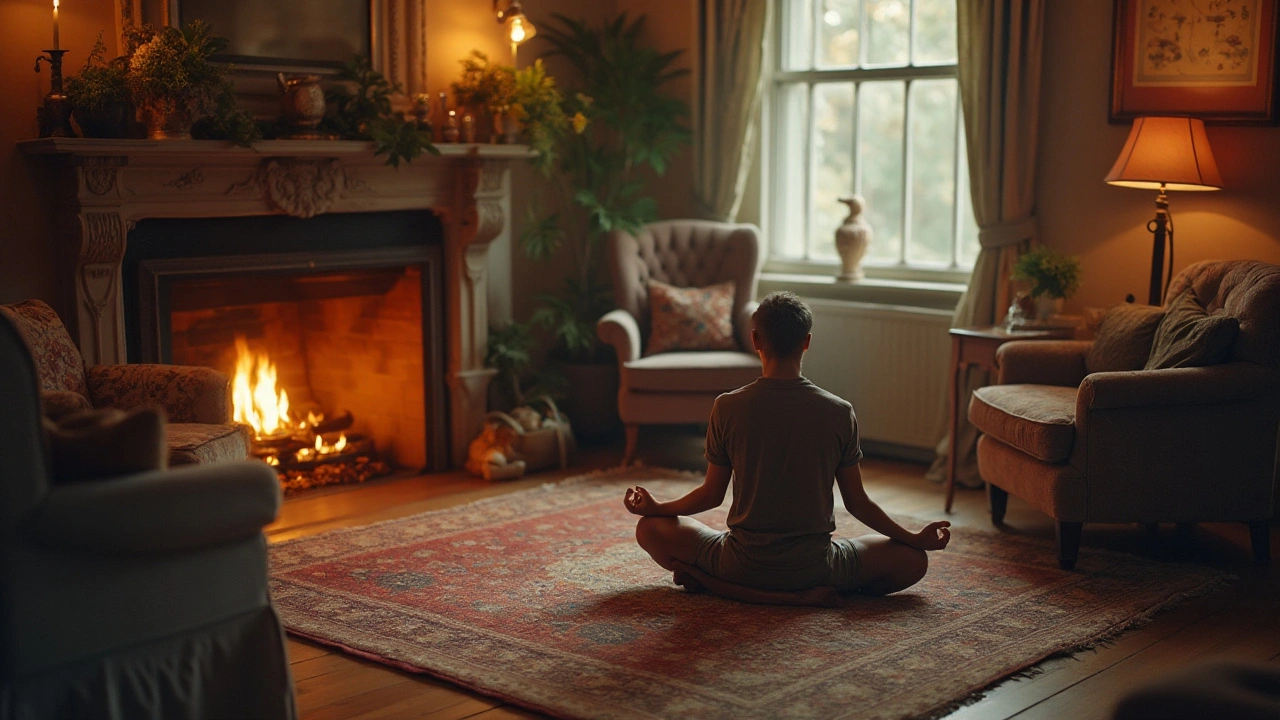
Breathing Exercises
It's amazing how something as simple as breathing can have such a profound impact on our overall wellness. Breathing exercises are among the most versatile and effective relaxation techniques you can implement daily. These exercises help to calm the mind, reduce stress, and even improve concentration. One of the most popular techniques is called diaphragmatic breathing or belly breathing, which involves deep inhalations that fill your lungs and expand your abdomen.
The science behind this is fascinating. When you take deep, slow breaths, it activates your parasympathetic nervous system, which is responsible for the body’s rest and digest response. This counters the fight-or-flight response induced by stress. Just a few minutes of focused breathing can lower your blood pressure, reduce cortisol levels, and create a sense of calm.
How to Perform Diaphragmatic Breathing
Let's break this down into simple steps to ensure you get it right:
- Sit or lie down in a comfortable position. Place one hand on your chest and the other on your abdomen.
- Take a slow, deep breath in through your nose. As you inhale, make sure your abdomen rises more than your chest.
- Hold your breath for a few seconds.
- Exhale slowly through your mouth, making a slight whooshing sound. Again, your abdomen should fall more than your chest.
- Repeat this process for five to ten minutes.
"Deep breathing sends a message to your brain to calm down and relax. The brain then sends this message to your body. Those things that happen when you are stressed, such as increased heart rate, fast breathing, and high blood pressure, all decrease as you breathe deeply to relax." - The American Institute of Stress
Another technique worth mentioning is the 4-7-8 method, developed by Dr. Andrew Weil. This method is incredibly simple but highly effective for stress relief:
- Inhale quietly through your nose for a count of four.
- Hold your breath for a count of seven.
- Exhale completely through your mouth, making a whoosh sound for a count of eight.
- Repeat the cycle four times.
These exercises are not just for special occasions or severe stress. Regular practice can help maintain your serenity and enhance your ability to handle stressful situations as they arise. It’s a small investment of time for a significantly positive impact on your mental and physical health.
You might find it helpful to set aside a specific time each day to practice these exercises. Morning and evening are generally good times, but the best time is whenever you are free and can focus on the practice without interruptions. Remember, consistency is key.
The Power of Nature
Have you ever noticed how a stroll through the park or a visit to the beach instantly lifts your spirits? That's not by coincidence. Nature has an incredible ability to soothe our minds and bodies, offering a perfect escape from the fast-paced, digital world we live in. Essentially, access to natural environments can significantly improve your mental health, reduce stress levels, and even boost your immune system.
Research shows that spending at least two hours a week in natural settings is linked to better health and well-being. This could be as simple as taking a walk in a local park, hiking a trail, or even just sitting under a tree. Various studies suggest that the sights, sounds, and smells of nature can lower blood pressure, reduce levels of the stress hormone cortisol, and improve mood.
One of the most appealing aspects of nature is its unending array of sensory inputs. The rustling of leaves, the chirping of birds, and the scent of blooming flowers all contribute to the calming effect. Forest bathing, a practice that originated in Japan, involves immersing oneself in a forest environment to reap its restorative benefits. Interestingly, forest bathing has been scientifically proven to lower heart rate and blood pressure while boosting overall feelings of well-being.
Author and environmentalist Richard Louv describes the predicament of modern-day disconnection from nature in his book, Last Child in the Woods. He coins the term 'nature-deficit disorder' to describe the growing gap between humans and the natural world. Louv states, "A walk in the woods is not just a walk in the woods. It can be the pathway to better health and a sense of inner peace."
Another fascinating aspect of nature's relaxing power is the concept of 'earthing' or 'grounding.' This involves making direct contact with the earth's surface, such as walking barefoot on grass or sand. Advocates of earthing argue that grounding can reduce inflammation, improve sleep, and promote a sense of calm. While more research is needed to fully understand the mechanism, many people find it a simple way to connect with nature and feel more relaxed.
Regardless of where you live, integrating nature into your daily routine can be incredibly beneficial. You might be surprised to find that even a short time outdoors can make a big difference. Whether it's gardening, bird-watching, or simply gazing at the stars, there are countless ways to tap into the power of nature. So next time you're feeling stressed or overwhelmed, try stepping outside and let nature work its magic.
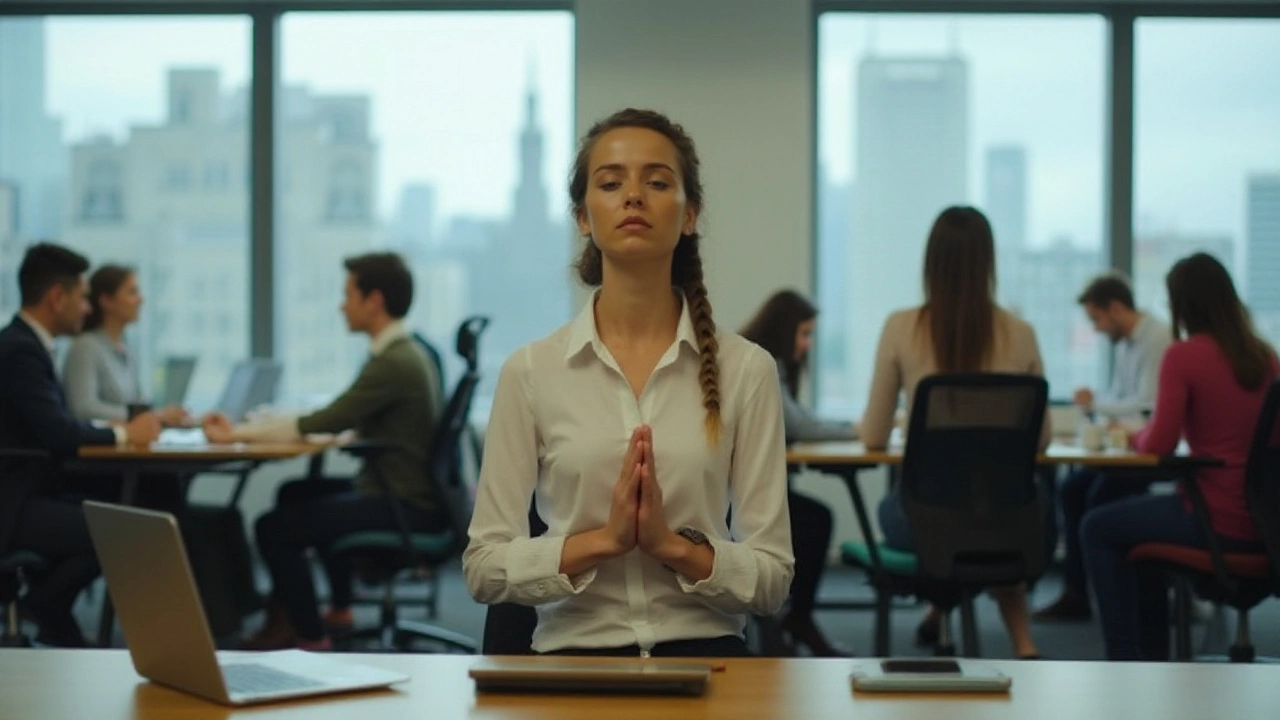
Physical Activity for Relaxation
When you think of physical activity, relaxation might not be the first thing that comes to mind. Yet, getting your body moving is one of the most effective ways to relieve stress and enhance your well-being. Exercise triggers the release of endorphins, those wonderful hormones that make us feel happy and relaxed. Even a brisk walk can help shift your focus away from daily worries and bring you into the present moment.
Various forms of exercise can contribute to a sense of calm. Yoga, for instance, is a fantastic way to link breath to movement and quiet the mind. Tai Chi, often described as 'meditation in motion,' involves slow, deliberate movements and deep breathing. These practices not only improve flexibility and balance but also promote mental clarity and relaxation.
For those who enjoy a bit more intensity, activities like running, swimming, or cycling can also be incredibly therapeutic. While cardio workouts get your heart pumping, they also help flush out the physical manifestations of stress. Plus, setting and achieving fitness goals, whether it’s running a marathon or swimming a certain number of laps, can provide a valuable sense of accomplishment.
Dr. John Ratey, a clinical professor of psychiatry at Harvard Medical School, often emphasizes the mental benefits of physical exercise. He notes, "Exercise is the single best thing you can do for your brain in terms of mood, memory, and learning."
Another noteworthy fact is that regular physical activity can help reduce anxiety and depression. According to the Anxiety and Depression Association of America, as little as five minutes of aerobic exercise can begin to stimulate anti-anxiety effects.
Group activities can offer additional benefits. Joining a local sports team or a fitness class can provide social interaction, which is crucial for emotional well-being. The camaraderie and collective spirit can make workouts feel less like a chore and more like a fun activity. Plus, having a scheduled class or team practice can add structure to your routine, making it easier to stick with your fitness goals.
Gardening is another excellent way to combine physical activity with relaxation. Digging, planting, and weeding can be surprisingly effective forms of exercise. The repetitive nature of these tasks can help to calm the mind, much like meditation. Additionally, being outdoors in the fresh air and sunshine has been shown to elevate mood and reduce stress levels.
For those who might find traditional exercise too demanding, even gentle activities like stretching or Pilates can be beneficial. The key is to find something you enjoy, so it feels less like a task and more like an enjoyable part of your day. Creating a playlist of your favorite music can add an extra layer of pleasure to your activity.
The benefits of integrating physical activity for relaxation are profound. Not only does it help to improve physical health, but it also plays a crucial role in maintaining mental and emotional balance. So, whether you prefer a serene yoga session or an invigorating run, find the activity that fits your lifestyle and make it a regular part of your routine. You'll likely find that this simple change can lead to a more peaceful, balanced life.
Incorporating Relaxation into Daily Life
Incorporating relaxation techniques into our daily lives doesn’t have to be a daunting task. Even with a packed schedule, there are small adjustments and practices you can adopt to pave the way for a more tranquil existence. The key lies in making these methods a natural part of your daily routine, ensuring they don't add to your already busy schedule. Let's explore practical ways to infuse relaxation into everyday moments.
One effective method is to start your day with a brief session of mindfulness or meditation. It doesn't require a lot of time; even five to ten minutes of focusing on your breath or using a meditation app can set a peaceful tone for the rest of the day. Studies have shown that brief daily meditations can significantly reduce stress levels and improve overall well-being.
Another simple yet powerful technique is mindful breathing. During the day, especially in moments of stress, take a few minutes to close your eyes and take deep, slow breaths. This practice helps activate the body's relaxation response and can be easily integrated into short breaks throughout your workday.
To incorporate relaxation into your evening routine, consider activities like reading a book, taking a warm bath, or practicing gentle yoga. These practices can help signal to your body that it is time to unwind, making it easier to fall asleep and improve the quality of your rest. Creating a bedtime ritual that excludes screens can also be hugely beneficial; the blue light from devices can interfere with your sleep cycle, so setting a screen-free time an hour before bed can work wonders.
It's also important to create a relaxing environment at home. This might mean decluttering your space, adding calming scents with essential oils, or playing soothing music. Small changes can have a remarkable impact on your ability to relax and recharge. Incorporating elements of nature, like houseplants, can also foster a serene atmosphere and improve air quality.
Consider also the power of physical activity. Gentle exercise like walking or stretching can serve as excellent relaxation techniques. Make it a habit to take short walks throughout your day, especially if you work in a sedentary job. Movement helps release tension and boosts endorphins, acting as a natural mood enhancer.
Lastly, don't overlook the value of social connections. Spending time with loved ones, sharing a meal, or simply talking can be very relaxing and fulfilling. Human connections play a crucial role in our emotional well-being, and nurturing these relationships can provide a significant emotional lift.
"We stress out because we think we have to do it all. But breathing, stretching, and taking pauses can help us achieve more in a calm and centered way," says Arianna Huffington, founder of The Huffington Post and Thrive Global.
Incorporating these practices into your routine can create a foundation for a more relaxed and fulfilling life. The goal is to find what works best for you and make it a consistent part of your daily life. By prioritizing relaxation, you not only improve your quality of life but also equip yourself with tools to handle stress more effectively.


